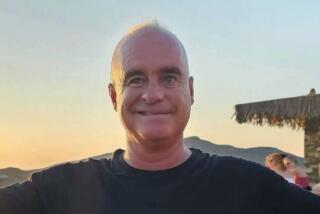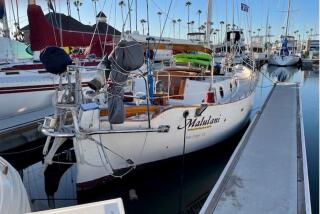Lawyer Who Traded Civilization for High Seas Missing Since June : Search: Mike Cisarik dropped out of the ‘rat race’ on his yacht in 1990. He was last heard from a few days after leaving New Zealand, bound for the Tonga Islands.
- Share via
Mike Cisarik, once one of Southern California’s most prominent civil rights lawyers, quit his practice about five years ago and headed to the South Seas by himself in a 40-foot yacht called The Rebel.
He said he wanted to leave the rat race behind.
The mystery is whether he intended to disappear.
Recently his relatives posted a $1,000 reward for information leading to Cisarik’s whereabouts. He has not been heard from since the first week of June, a few days after he left New Zealand, sailing north for the Tonga Islands.
Ordinarily, that 1,000-mile journey takes about two weeks. But, according to authorities in New Zealand, Cisarik carried enough food, water and fuel to last six months--or more.
Marine authorities said Wednesday they have no reason to believe that Cisarik has met his death, but they stressed that they have ruled nothing out--including the possibility that he fell overboard and drowned.
“Single yachts-people have been known to do that, inadvertently, and there is no one to pick them up,” said Capt. Tim Nicol of New Zealand’s Maritime Safety Authority.
Cisarik’s sister said she believes he is still alive.
“He’s in a disabled boat somewhere floating around somewhere in the South Pacific. Or he’s stranded on a remote island,” said Barbara Becker, a legal secretary in Valparaiso, Ind. “He’s a good sailor and he’s a survivor.”
Cisarik’s friends said they suspect he’s not only alive--he’s doing well.
“My guess is he’s some place enjoying himself in a way that contact with the outside world would impair,” said Venice civil rights lawyer Stephen Yagman.
“He always wanted to get away from the constraints of civilized society,” Yagman said. “I put my money on him being on an island somewhere with people whom he found . . . civilized.”
Cisarik, 50, has alternately embraced and rejected the mainstream.
He was born and raised in northwest Indiana. After what were described as many scraps with a drunken father, he moved in with his sister, Barbara, two years older than he.
He joined the Marines and saw action in Vietnam during the Tet offensive in 1968. After that, his sister said, he flew cargo planes from Miami to the Bahamas and worked as an air traffic controller. Then he landed a scholarship to law school, at Northwestern University in Chicago.
In 1976, he moved west, settling in Orange County, where he served as a deputy district attorney for two years. Then he hung out his own shingle.
For the next dozen years, Cisarik built a civil rights practice, mostly pressing cases against police officers accused of using excessive force.
In the mid-1980s, he made his name in a case alleging that the Orange County Sheriff’s Department spied on a college professor, a Municipal Court judge and a private investigator--all critics of Sheriff Brad Gates.
He went on to represent the private investigator, Preston Guillory, now of Riverside, in a related lawsuit alleging that the process for issuing gun permits in Orange County was pervaded by cronyism and political favoritism.
Both cases ultimately ended with the county paying large settlements.
With his share, Cisarik bought The Rebel, a steel-hulled yacht, and made plans to set sail.
“He was constantly talking about . . . how he was going to sail the rest of his life and have annuity checks mailed to him at different locations around the world,” the college professor, George Wright, said Wednesday.
In November, 1990, Cisarik left California. He sailed down the western coast of Mexico and Central America, then headed west to the South Pacific.
On June 2 or 3 of this year he left Auckland, New Zealand, for the warmth of the Tonga Islands, Nicol said.
His sister said she understands from radio broadcasts and inquiries by marine authorities that Cisarik was having trouble with steering gear aboard the boat. So, she said, he stopped at Great Barrier Island, about 60 miles northeast of Auckland, for a six-hour repair.
On June 6 or 7, Nicol said, Cisarik made contact with another American yacht, saying he was in “boisterous” weather with water splashing over the deck.
At the time, The Rebel was still close enough to New Zealand to be heard by radio operators onshore. Cisarik never transmitted a mayday call, Nicol said.
Cisarik’s last reported position was about 220 miles north of New Zealand, Nicol said.
Shortly before leaving Auckland, he had written his sister a letter detailing his trip to the Tonga Islands and expressing some concern over the waters a bit to the north, between the 32nd and 30th parallels.
Nicol, however, said there were no significant storms in June that would have marred Cisarik’s expected route.
In July, with no sign of Cisarik in the Tonga Islands, New Zealand authorities asked all boats, ships and harbor masters to look out for him.
A search, Nicol said, would be impractical. The ocean is simply too vast.
Of particular concern to New Zealand authorities is whether Cisarik pulled an end-run when confronted with the nation’s safe-boating rules.
All yachts departing New Zealand are required to pass a government inspection for seaworthiness, including proof of an on-board emergency locater beacon known by the acronym EPIRB. When activated, it sends a message to an orbiting satellite, which can pinpoint a troubled yacht’s location.
Cisarik declared on his inspection forms that he had such a beacon, Nicol said. But Maureen Cullen, who with her husband operates Kerikeri Marine Radio on New Zealand’s North Island, said she has been told that Cisarik borrowed a beacon to clear the inspection--and then gave it back to its owner before sailing.
Guillory said Wednesday that he recalled Cisarik telling him during their court fights, “If I am going to die, I would like to die on my boat.”
Perhaps, however, Cisarik had other plans first.
“A lot of yachtsmen . . . don’t want to be found. We have to respect that. That’s why he sailed alone. He liked his own company,” Nicol said.
“We won’t know until he turns up. And he could well turn up tomorrow.”
More to Read
Sign up for Essential California
The most important California stories and recommendations in your inbox every morning.
You may occasionally receive promotional content from the Los Angeles Times.













